Entrepreneurship and Small Business: Types, Impacts, and Skills Report
VerifiedAdded on 2023/01/19
|15
|4810
|99
Report
AI Summary
This report provides a comprehensive overview of entrepreneurship and small business management. It begins by defining entrepreneurship and its significance, then delves into various types of entrepreneurial ventures, including small businesses, scalable startups, large company entrepreneurship, and social entrepreneurship, highlighting their differences and similarities. The report further analyzes the impact of small and micro businesses on the economy, emphasizing their role in job creation and economic growth. It also explores the importance of small businesses, their contributions to innovation, and their impact on local economies. Furthermore, the report identifies the skills and characteristics of successful entrepreneurs, differentiating them from traditional managers. Finally, it examines the entrepreneurial mindset, motivation, and how background and experience can influence entrepreneurial success.

Entrepreneurship and
Small Business
Management
Small Business
Management
Paraphrase This Document
Need a fresh take? Get an instant paraphrase of this document with our AI Paraphraser
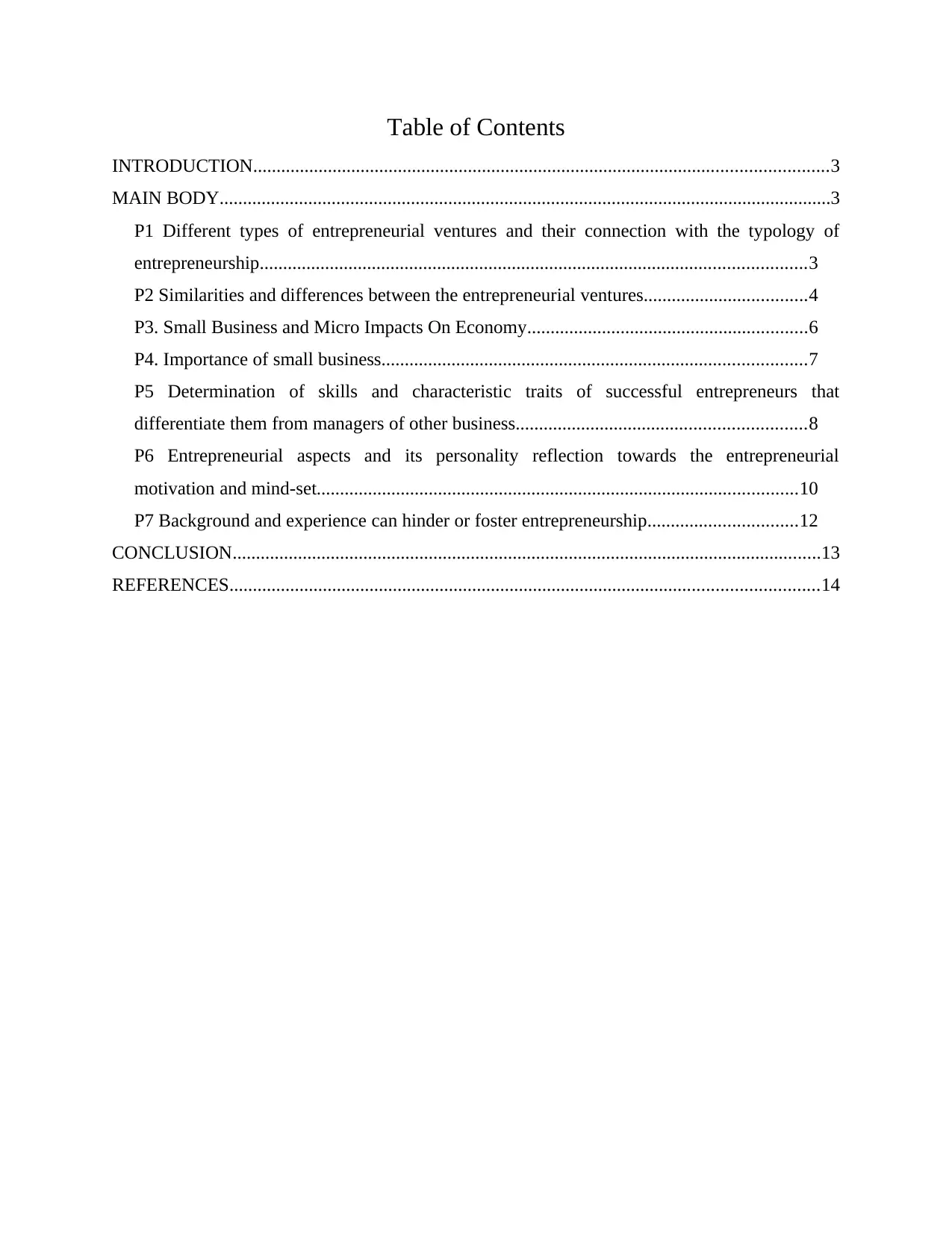
Table of Contents
INTRODUCTION...........................................................................................................................3
MAIN BODY...................................................................................................................................3
P1 Different types of entrepreneurial ventures and their connection with the typology of
entrepreneurship.....................................................................................................................3
P2 Similarities and differences between the entrepreneurial ventures...................................4
P3. Small Business and Micro Impacts On Economy............................................................6
P4. Importance of small business...........................................................................................7
P5 Determination of skills and characteristic traits of successful entrepreneurs that
differentiate them from managers of other business..............................................................8
P6 Entrepreneurial aspects and its personality reflection towards the entrepreneurial
motivation and mind-set.......................................................................................................10
P7 Background and experience can hinder or foster entrepreneurship................................12
CONCLUSION..............................................................................................................................13
REFERENCES..............................................................................................................................14
INTRODUCTION...........................................................................................................................3
MAIN BODY...................................................................................................................................3
P1 Different types of entrepreneurial ventures and their connection with the typology of
entrepreneurship.....................................................................................................................3
P2 Similarities and differences between the entrepreneurial ventures...................................4
P3. Small Business and Micro Impacts On Economy............................................................6
P4. Importance of small business...........................................................................................7
P5 Determination of skills and characteristic traits of successful entrepreneurs that
differentiate them from managers of other business..............................................................8
P6 Entrepreneurial aspects and its personality reflection towards the entrepreneurial
motivation and mind-set.......................................................................................................10
P7 Background and experience can hinder or foster entrepreneurship................................12
CONCLUSION..............................................................................................................................13
REFERENCES..............................................................................................................................14
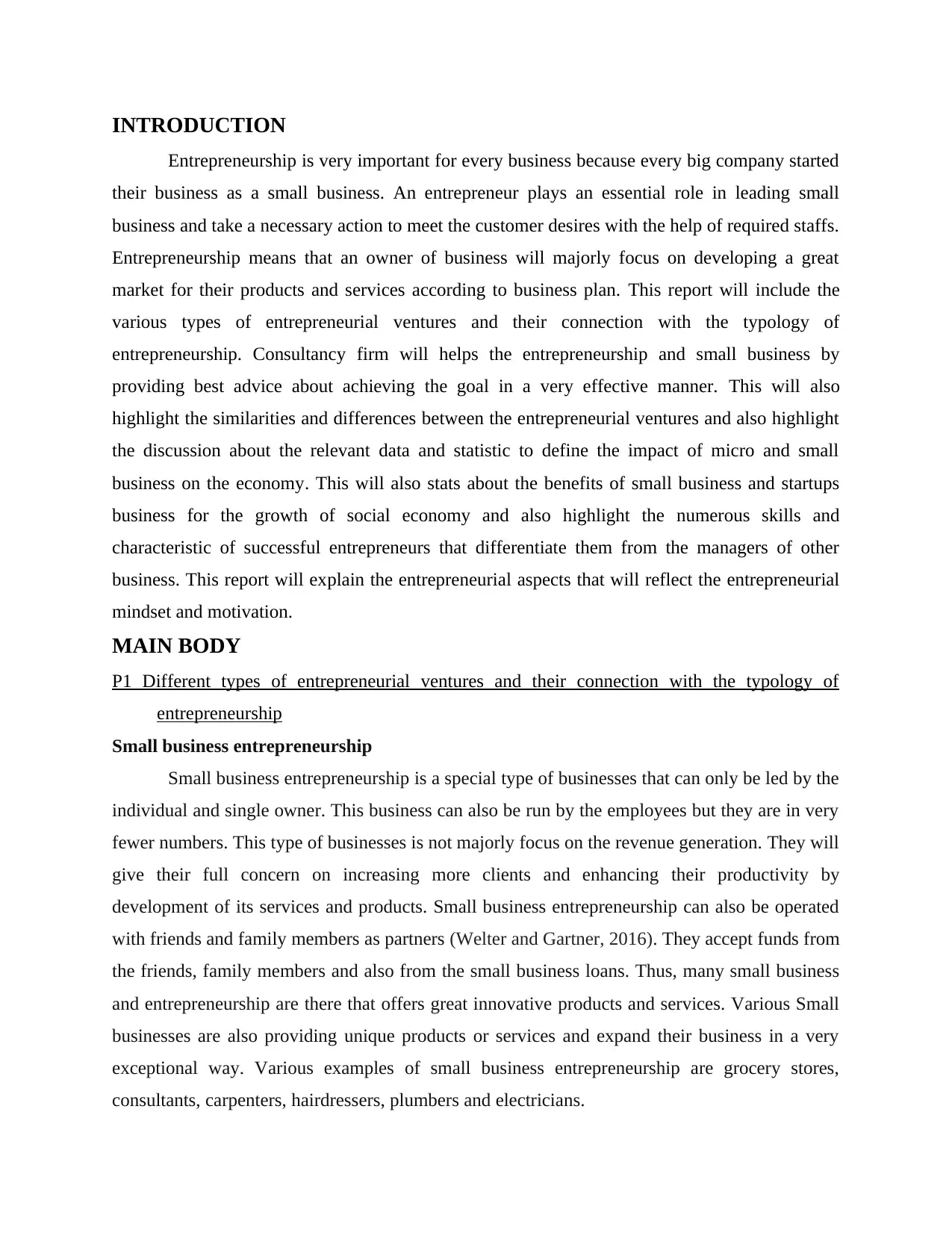
INTRODUCTION
Entrepreneurship is very important for every business because every big company started
their business as a small business. An entrepreneur plays an essential role in leading small
business and take a necessary action to meet the customer desires with the help of required staffs.
Entrepreneurship means that an owner of business will majorly focus on developing a great
market for their products and services according to business plan. This report will include the
various types of entrepreneurial ventures and their connection with the typology of
entrepreneurship. Consultancy firm will helps the entrepreneurship and small business by
providing best advice about achieving the goal in a very effective manner. This will also
highlight the similarities and differences between the entrepreneurial ventures and also highlight
the discussion about the relevant data and statistic to define the impact of micro and small
business on the economy. This will also stats about the benefits of small business and startups
business for the growth of social economy and also highlight the numerous skills and
characteristic of successful entrepreneurs that differentiate them from the managers of other
business. This report will explain the entrepreneurial aspects that will reflect the entrepreneurial
mindset and motivation.
MAIN BODY
P1 Different types of entrepreneurial ventures and their connection with the typology of
entrepreneurship
Small business entrepreneurship
Small business entrepreneurship is a special type of businesses that can only be led by the
individual and single owner. This business can also be run by the employees but they are in very
fewer numbers. This type of businesses is not majorly focus on the revenue generation. They will
give their full concern on increasing more clients and enhancing their productivity by
development of its services and products. Small business entrepreneurship can also be operated
with friends and family members as partners (Welter and Gartner, 2016). They accept funds from
the friends, family members and also from the small business loans. Thus, many small business
and entrepreneurship are there that offers great innovative products and services. Various Small
businesses are also providing unique products or services and expand their business in a very
exceptional way. Various examples of small business entrepreneurship are grocery stores,
consultants, carpenters, hairdressers, plumbers and electricians.
Entrepreneurship is very important for every business because every big company started
their business as a small business. An entrepreneur plays an essential role in leading small
business and take a necessary action to meet the customer desires with the help of required staffs.
Entrepreneurship means that an owner of business will majorly focus on developing a great
market for their products and services according to business plan. This report will include the
various types of entrepreneurial ventures and their connection with the typology of
entrepreneurship. Consultancy firm will helps the entrepreneurship and small business by
providing best advice about achieving the goal in a very effective manner. This will also
highlight the similarities and differences between the entrepreneurial ventures and also highlight
the discussion about the relevant data and statistic to define the impact of micro and small
business on the economy. This will also stats about the benefits of small business and startups
business for the growth of social economy and also highlight the numerous skills and
characteristic of successful entrepreneurs that differentiate them from the managers of other
business. This report will explain the entrepreneurial aspects that will reflect the entrepreneurial
mindset and motivation.
MAIN BODY
P1 Different types of entrepreneurial ventures and their connection with the typology of
entrepreneurship
Small business entrepreneurship
Small business entrepreneurship is a special type of businesses that can only be led by the
individual and single owner. This business can also be run by the employees but they are in very
fewer numbers. This type of businesses is not majorly focus on the revenue generation. They will
give their full concern on increasing more clients and enhancing their productivity by
development of its services and products. Small business entrepreneurship can also be operated
with friends and family members as partners (Welter and Gartner, 2016). They accept funds from
the friends, family members and also from the small business loans. Thus, many small business
and entrepreneurship are there that offers great innovative products and services. Various Small
businesses are also providing unique products or services and expand their business in a very
exceptional way. Various examples of small business entrepreneurship are grocery stores,
consultants, carpenters, hairdressers, plumbers and electricians.
⊘ This is a preview!⊘
Do you want full access?
Subscribe today to unlock all pages.

Trusted by 1+ million students worldwide
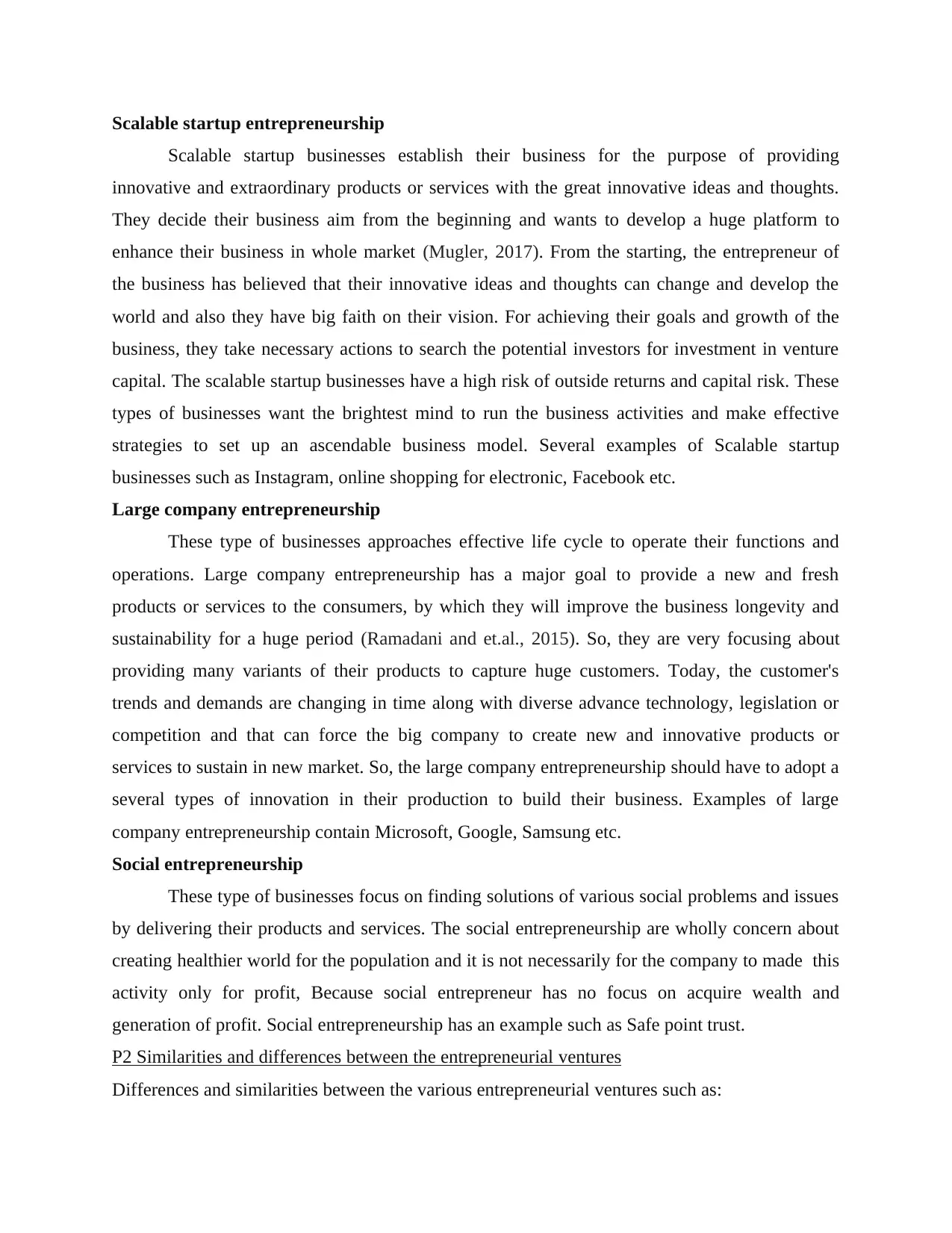
Scalable startup entrepreneurship
Scalable startup businesses establish their business for the purpose of providing
innovative and extraordinary products or services with the great innovative ideas and thoughts.
They decide their business aim from the beginning and wants to develop a huge platform to
enhance their business in whole market (Mugler, 2017). From the starting, the entrepreneur of
the business has believed that their innovative ideas and thoughts can change and develop the
world and also they have big faith on their vision. For achieving their goals and growth of the
business, they take necessary actions to search the potential investors for investment in venture
capital. The scalable startup businesses have a high risk of outside returns and capital risk. These
types of businesses want the brightest mind to run the business activities and make effective
strategies to set up an ascendable business model. Several examples of Scalable startup
businesses such as Instagram, online shopping for electronic, Facebook etc.
Large company entrepreneurship
These type of businesses approaches effective life cycle to operate their functions and
operations. Large company entrepreneurship has a major goal to provide a new and fresh
products or services to the consumers, by which they will improve the business longevity and
sustainability for a huge period (Ramadani and et.al., 2015). So, they are very focusing about
providing many variants of their products to capture huge customers. Today, the customer's
trends and demands are changing in time along with diverse advance technology, legislation or
competition and that can force the big company to create new and innovative products or
services to sustain in new market. So, the large company entrepreneurship should have to adopt a
several types of innovation in their production to build their business. Examples of large
company entrepreneurship contain Microsoft, Google, Samsung etc.
Social entrepreneurship
These type of businesses focus on finding solutions of various social problems and issues
by delivering their products and services. The social entrepreneurship are wholly concern about
creating healthier world for the population and it is not necessarily for the company to made this
activity only for profit, Because social entrepreneur has no focus on acquire wealth and
generation of profit. Social entrepreneurship has an example such as Safe point trust.
P2 Similarities and differences between the entrepreneurial ventures
Differences and similarities between the various entrepreneurial ventures such as:
Scalable startup businesses establish their business for the purpose of providing
innovative and extraordinary products or services with the great innovative ideas and thoughts.
They decide their business aim from the beginning and wants to develop a huge platform to
enhance their business in whole market (Mugler, 2017). From the starting, the entrepreneur of
the business has believed that their innovative ideas and thoughts can change and develop the
world and also they have big faith on their vision. For achieving their goals and growth of the
business, they take necessary actions to search the potential investors for investment in venture
capital. The scalable startup businesses have a high risk of outside returns and capital risk. These
types of businesses want the brightest mind to run the business activities and make effective
strategies to set up an ascendable business model. Several examples of Scalable startup
businesses such as Instagram, online shopping for electronic, Facebook etc.
Large company entrepreneurship
These type of businesses approaches effective life cycle to operate their functions and
operations. Large company entrepreneurship has a major goal to provide a new and fresh
products or services to the consumers, by which they will improve the business longevity and
sustainability for a huge period (Ramadani and et.al., 2015). So, they are very focusing about
providing many variants of their products to capture huge customers. Today, the customer's
trends and demands are changing in time along with diverse advance technology, legislation or
competition and that can force the big company to create new and innovative products or
services to sustain in new market. So, the large company entrepreneurship should have to adopt a
several types of innovation in their production to build their business. Examples of large
company entrepreneurship contain Microsoft, Google, Samsung etc.
Social entrepreneurship
These type of businesses focus on finding solutions of various social problems and issues
by delivering their products and services. The social entrepreneurship are wholly concern about
creating healthier world for the population and it is not necessarily for the company to made this
activity only for profit, Because social entrepreneur has no focus on acquire wealth and
generation of profit. Social entrepreneurship has an example such as Safe point trust.
P2 Similarities and differences between the entrepreneurial ventures
Differences and similarities between the various entrepreneurial ventures such as:
Paraphrase This Document
Need a fresh take? Get an instant paraphrase of this document with our AI Paraphraser
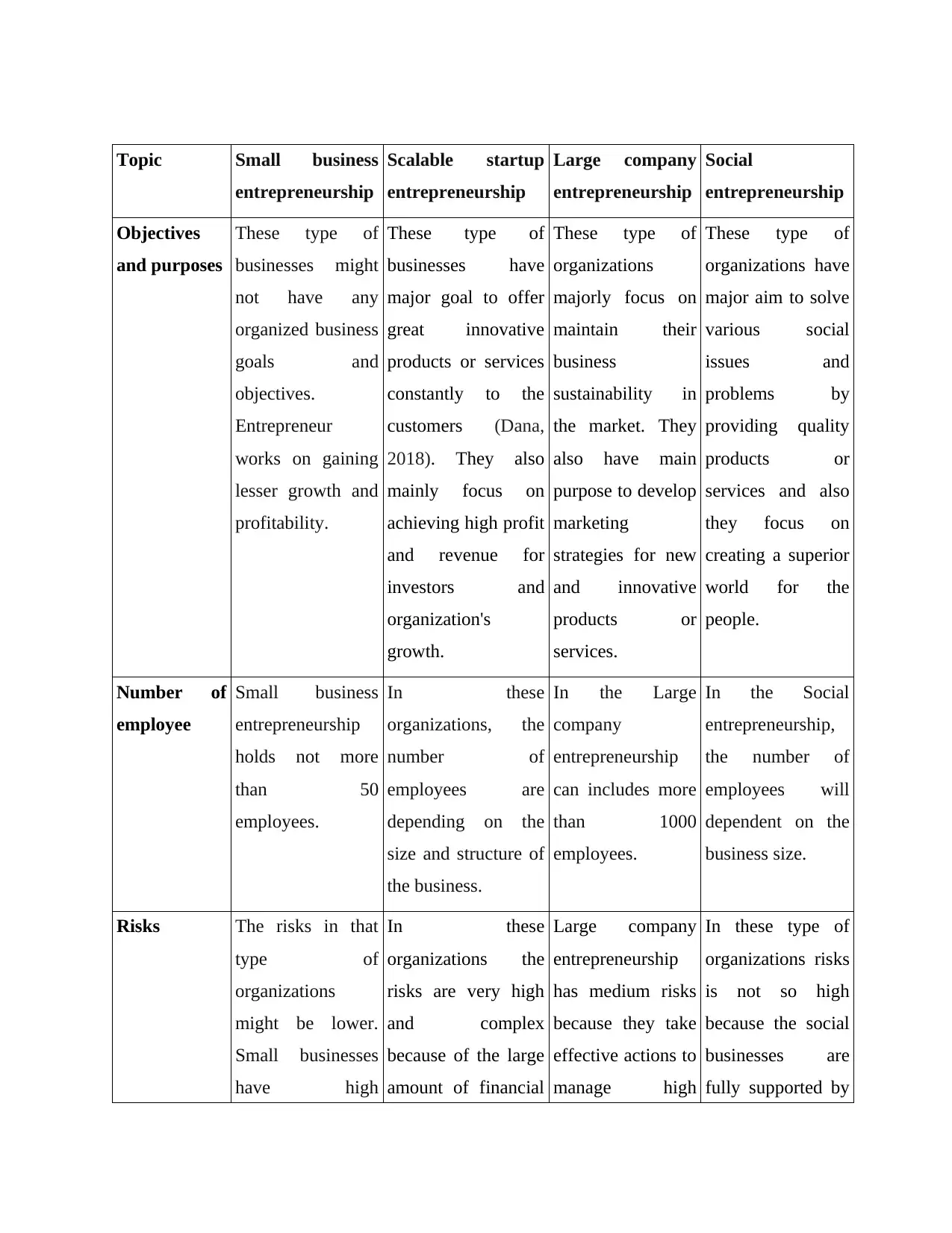
Topic Small business
entrepreneurship
Scalable startup
entrepreneurship
Large company
entrepreneurship
Social
entrepreneurship
Objectives
and purposes
These type of
businesses might
not have any
organized business
goals and
objectives.
Entrepreneur
works on gaining
lesser growth and
profitability.
These type of
businesses have
major goal to offer
great innovative
products or services
constantly to the
customers (Dana,
2018). They also
mainly focus on
achieving high profit
and revenue for
investors and
organization's
growth.
These type of
organizations
majorly focus on
maintain their
business
sustainability in
the market. They
also have main
purpose to develop
marketing
strategies for new
and innovative
products or
services.
These type of
organizations have
major aim to solve
various social
issues and
problems by
providing quality
products or
services and also
they focus on
creating a superior
world for the
people.
Number of
employee
Small business
entrepreneurship
holds not more
than 50
employees.
In these
organizations, the
number of
employees are
depending on the
size and structure of
the business.
In the Large
company
entrepreneurship
can includes more
than 1000
employees.
In the Social
entrepreneurship,
the number of
employees will
dependent on the
business size.
Risks The risks in that
type of
organizations
might be lower.
Small businesses
have high
In these
organizations the
risks are very high
and complex
because of the large
amount of financial
Large company
entrepreneurship
has medium risks
because they take
effective actions to
manage high
In these type of
organizations risks
is not so high
because the social
businesses are
fully supported by
entrepreneurship
Scalable startup
entrepreneurship
Large company
entrepreneurship
Social
entrepreneurship
Objectives
and purposes
These type of
businesses might
not have any
organized business
goals and
objectives.
Entrepreneur
works on gaining
lesser growth and
profitability.
These type of
businesses have
major goal to offer
great innovative
products or services
constantly to the
customers (Dana,
2018). They also
mainly focus on
achieving high profit
and revenue for
investors and
organization's
growth.
These type of
organizations
majorly focus on
maintain their
business
sustainability in
the market. They
also have main
purpose to develop
marketing
strategies for new
and innovative
products or
services.
These type of
organizations have
major aim to solve
various social
issues and
problems by
providing quality
products or
services and also
they focus on
creating a superior
world for the
people.
Number of
employee
Small business
entrepreneurship
holds not more
than 50
employees.
In these
organizations, the
number of
employees are
depending on the
size and structure of
the business.
In the Large
company
entrepreneurship
can includes more
than 1000
employees.
In the Social
entrepreneurship,
the number of
employees will
dependent on the
business size.
Risks The risks in that
type of
organizations
might be lower.
Small businesses
have high
In these
organizations the
risks are very high
and complex
because of the large
amount of financial
Large company
entrepreneurship
has medium risks
because they take
effective actions to
manage high
In these type of
organizations risks
is not so high
because the social
businesses are
fully supported by
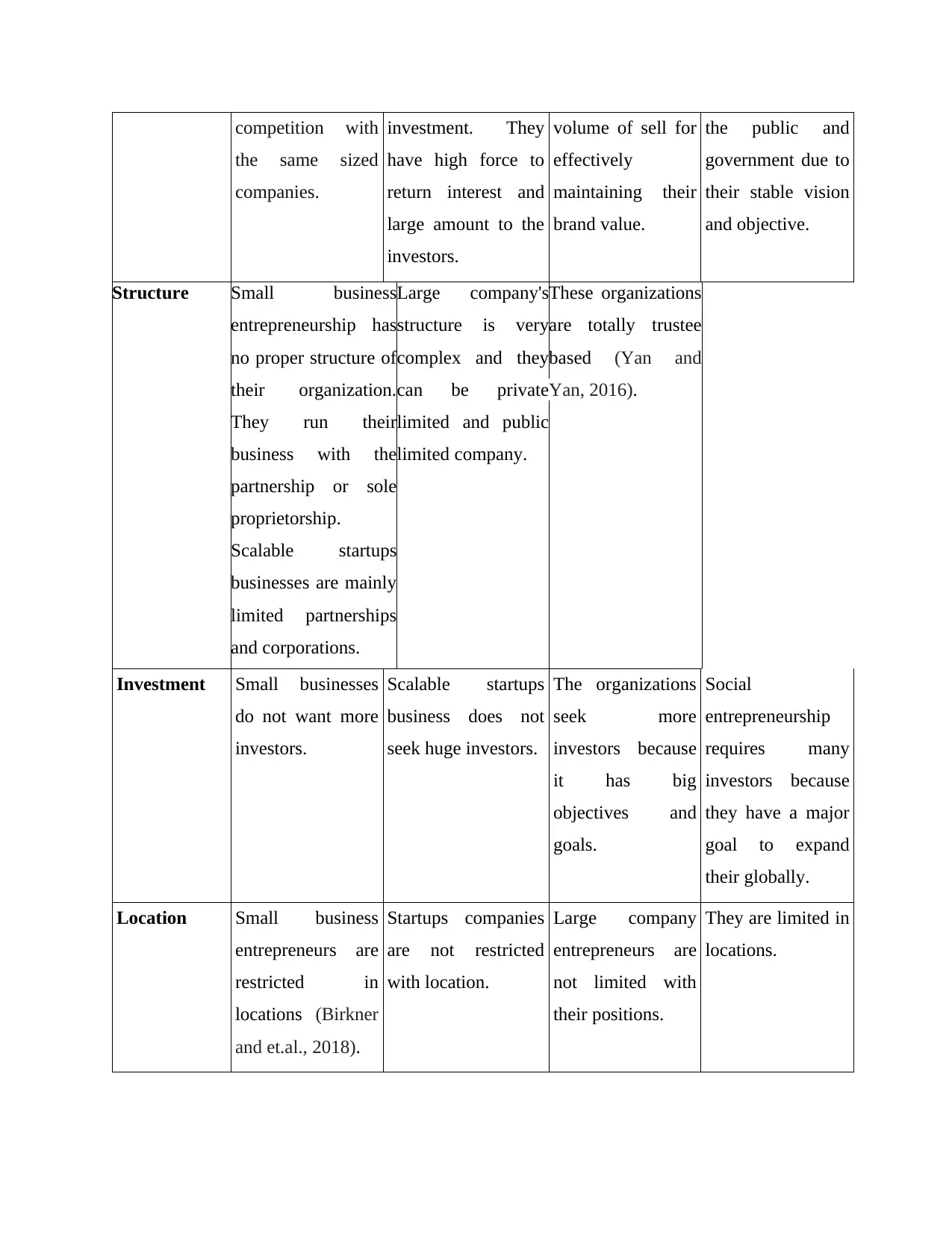
competition with
the same sized
companies.
investment. They
have high force to
return interest and
large amount to the
investors.
volume of sell for
effectively
maintaining their
brand value.
the public and
government due to
their stable vision
and objective.
Structure Small business
entrepreneurship has
no proper structure of
their organization.
They run their
business with the
partnership or sole
proprietorship.
Scalable startups
businesses are mainly
limited partnerships
and corporations.
Large company's
structure is very
complex and they
can be private
limited and public
limited company.
These organizations
are totally trustee
based (Yan and
Yan, 2016).
Investment Small businesses
do not want more
investors.
Scalable startups
business does not
seek huge investors.
The organizations
seek more
investors because
it has big
objectives and
goals.
Social
entrepreneurship
requires many
investors because
they have a major
goal to expand
their globally.
Location Small business
entrepreneurs are
restricted in
locations (Birkner
and et.al., 2018).
Startups companies
are not restricted
with location.
Large company
entrepreneurs are
not limited with
their positions.
They are limited in
locations.
the same sized
companies.
investment. They
have high force to
return interest and
large amount to the
investors.
volume of sell for
effectively
maintaining their
brand value.
the public and
government due to
their stable vision
and objective.
Structure Small business
entrepreneurship has
no proper structure of
their organization.
They run their
business with the
partnership or sole
proprietorship.
Scalable startups
businesses are mainly
limited partnerships
and corporations.
Large company's
structure is very
complex and they
can be private
limited and public
limited company.
These organizations
are totally trustee
based (Yan and
Yan, 2016).
Investment Small businesses
do not want more
investors.
Scalable startups
business does not
seek huge investors.
The organizations
seek more
investors because
it has big
objectives and
goals.
Social
entrepreneurship
requires many
investors because
they have a major
goal to expand
their globally.
Location Small business
entrepreneurs are
restricted in
locations (Birkner
and et.al., 2018).
Startups companies
are not restricted
with location.
Large company
entrepreneurs are
not limited with
their positions.
They are limited in
locations.
⊘ This is a preview!⊘
Do you want full access?
Subscribe today to unlock all pages.

Trusted by 1+ million students worldwide
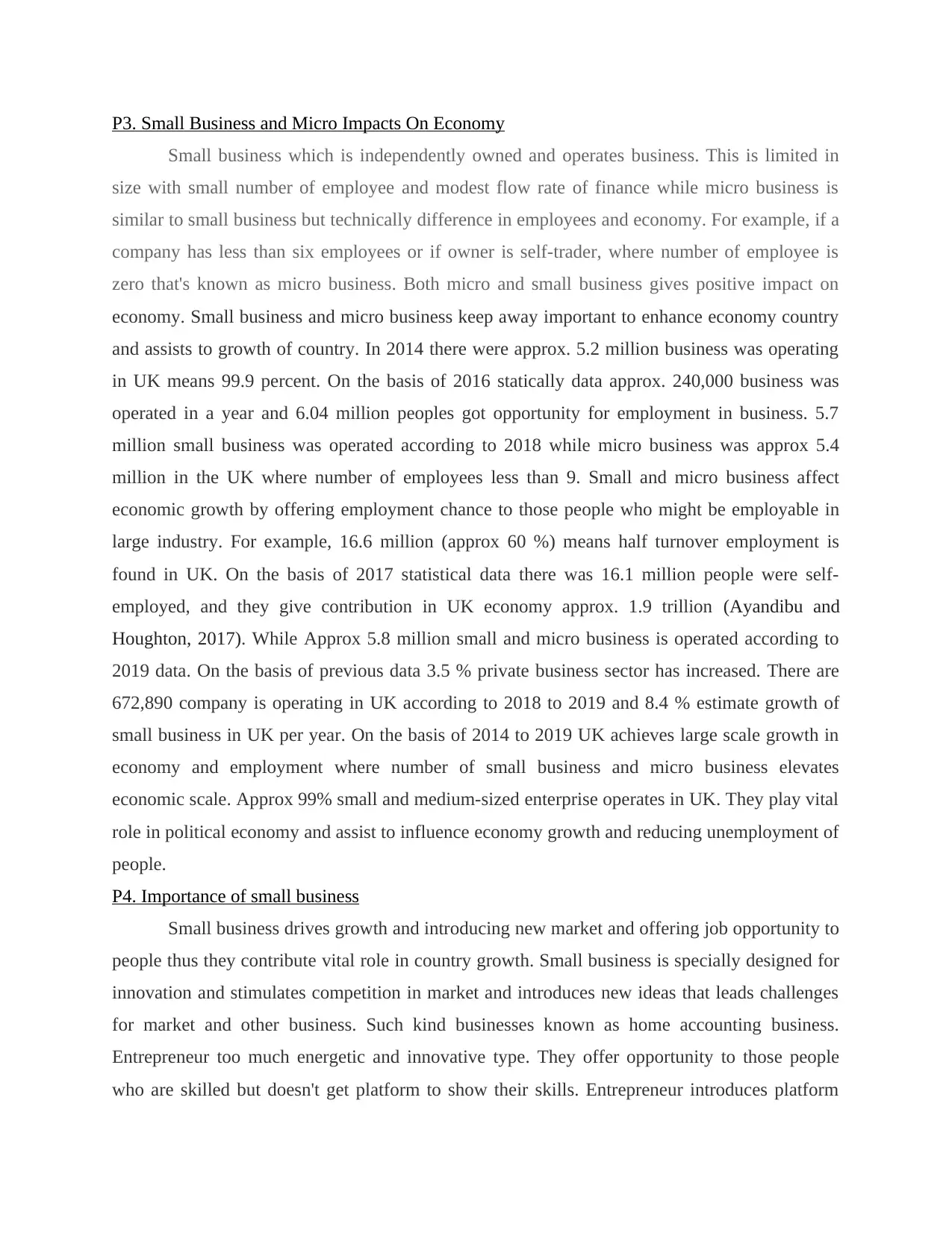
P3. Small Business and Micro Impacts On Economy
Small business which is independently owned and operates business. This is limited in
size with small number of employee and modest flow rate of finance while micro business is
similar to small business but technically difference in employees and economy. For example, if a
company has less than six employees or if owner is self-trader, where number of employee is
zero that's known as micro business. Both micro and small business gives positive impact on
economy. Small business and micro business keep away important to enhance economy country
and assists to growth of country. In 2014 there were approx. 5.2 million business was operating
in UK means 99.9 percent. On the basis of 2016 statically data approx. 240,000 business was
operated in a year and 6.04 million peoples got opportunity for employment in business. 5.7
million small business was operated according to 2018 while micro business was approx 5.4
million in the UK where number of employees less than 9. Small and micro business affect
economic growth by offering employment chance to those people who might be employable in
large industry. For example, 16.6 million (approx 60 %) means half turnover employment is
found in UK. On the basis of 2017 statistical data there was 16.1 million people were self-
employed, and they give contribution in UK economy approx. 1.9 trillion (Ayandibu and
Houghton, 2017). While Approx 5.8 million small and micro business is operated according to
2019 data. On the basis of previous data 3.5 % private business sector has increased. There are
672,890 company is operating in UK according to 2018 to 2019 and 8.4 % estimate growth of
small business in UK per year. On the basis of 2014 to 2019 UK achieves large scale growth in
economy and employment where number of small business and micro business elevates
economic scale. Approx 99% small and medium-sized enterprise operates in UK. They play vital
role in political economy and assist to influence economy growth and reducing unemployment of
people.
P4. Importance of small business
Small business drives growth and introducing new market and offering job opportunity to
people thus they contribute vital role in country growth. Small business is specially designed for
innovation and stimulates competition in market and introduces new ideas that leads challenges
for market and other business. Such kind businesses known as home accounting business.
Entrepreneur too much energetic and innovative type. They offer opportunity to those people
who are skilled but doesn't get platform to show their skills. Entrepreneur introduces platform
Small business which is independently owned and operates business. This is limited in
size with small number of employee and modest flow rate of finance while micro business is
similar to small business but technically difference in employees and economy. For example, if a
company has less than six employees or if owner is self-trader, where number of employee is
zero that's known as micro business. Both micro and small business gives positive impact on
economy. Small business and micro business keep away important to enhance economy country
and assists to growth of country. In 2014 there were approx. 5.2 million business was operating
in UK means 99.9 percent. On the basis of 2016 statically data approx. 240,000 business was
operated in a year and 6.04 million peoples got opportunity for employment in business. 5.7
million small business was operated according to 2018 while micro business was approx 5.4
million in the UK where number of employees less than 9. Small and micro business affect
economic growth by offering employment chance to those people who might be employable in
large industry. For example, 16.6 million (approx 60 %) means half turnover employment is
found in UK. On the basis of 2017 statistical data there was 16.1 million people were self-
employed, and they give contribution in UK economy approx. 1.9 trillion (Ayandibu and
Houghton, 2017). While Approx 5.8 million small and micro business is operated according to
2019 data. On the basis of previous data 3.5 % private business sector has increased. There are
672,890 company is operating in UK according to 2018 to 2019 and 8.4 % estimate growth of
small business in UK per year. On the basis of 2014 to 2019 UK achieves large scale growth in
economy and employment where number of small business and micro business elevates
economic scale. Approx 99% small and medium-sized enterprise operates in UK. They play vital
role in political economy and assist to influence economy growth and reducing unemployment of
people.
P4. Importance of small business
Small business drives growth and introducing new market and offering job opportunity to
people thus they contribute vital role in country growth. Small business is specially designed for
innovation and stimulates competition in market and introduces new ideas that leads challenges
for market and other business. Such kind businesses known as home accounting business.
Entrepreneur too much energetic and innovative type. They offer opportunity to those people
who are skilled but doesn't get platform to show their skills. Entrepreneur introduces platform
Paraphrase This Document
Need a fresh take? Get an instant paraphrase of this document with our AI Paraphraser
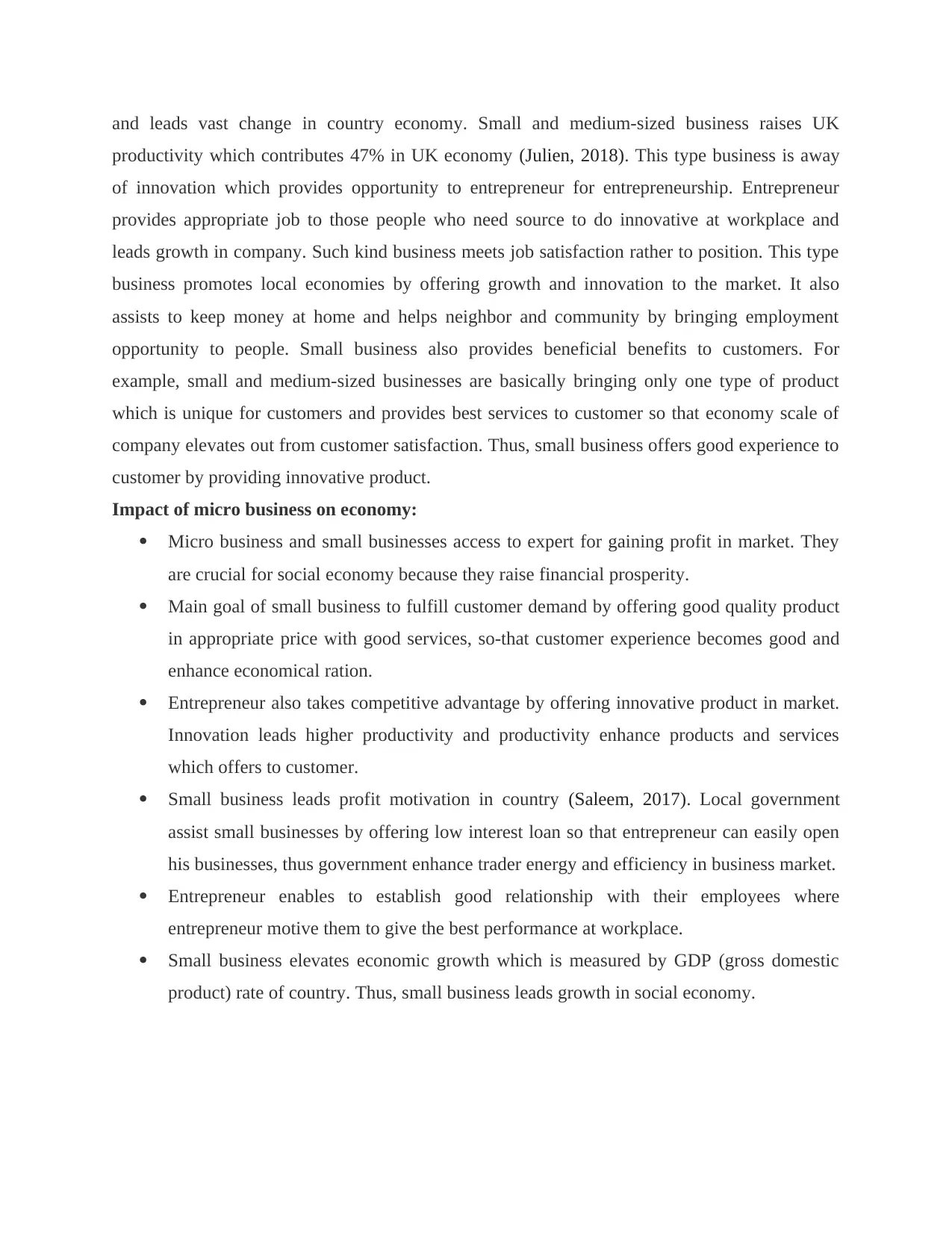
and leads vast change in country economy. Small and medium-sized business raises UK
productivity which contributes 47% in UK economy (Julien, 2018). This type business is away
of innovation which provides opportunity to entrepreneur for entrepreneurship. Entrepreneur
provides appropriate job to those people who need source to do innovative at workplace and
leads growth in company. Such kind business meets job satisfaction rather to position. This type
business promotes local economies by offering growth and innovation to the market. It also
assists to keep money at home and helps neighbor and community by bringing employment
opportunity to people. Small business also provides beneficial benefits to customers. For
example, small and medium-sized businesses are basically bringing only one type of product
which is unique for customers and provides best services to customer so that economy scale of
company elevates out from customer satisfaction. Thus, small business offers good experience to
customer by providing innovative product.
Impact of micro business on economy:
Micro business and small businesses access to expert for gaining profit in market. They
are crucial for social economy because they raise financial prosperity.
Main goal of small business to fulfill customer demand by offering good quality product
in appropriate price with good services, so-that customer experience becomes good and
enhance economical ration.
Entrepreneur also takes competitive advantage by offering innovative product in market.
Innovation leads higher productivity and productivity enhance products and services
which offers to customer.
Small business leads profit motivation in country (Saleem, 2017). Local government
assist small businesses by offering low interest loan so that entrepreneur can easily open
his businesses, thus government enhance trader energy and efficiency in business market.
Entrepreneur enables to establish good relationship with their employees where
entrepreneur motive them to give the best performance at workplace.
Small business elevates economic growth which is measured by GDP (gross domestic
product) rate of country. Thus, small business leads growth in social economy.
productivity which contributes 47% in UK economy (Julien, 2018). This type business is away
of innovation which provides opportunity to entrepreneur for entrepreneurship. Entrepreneur
provides appropriate job to those people who need source to do innovative at workplace and
leads growth in company. Such kind business meets job satisfaction rather to position. This type
business promotes local economies by offering growth and innovation to the market. It also
assists to keep money at home and helps neighbor and community by bringing employment
opportunity to people. Small business also provides beneficial benefits to customers. For
example, small and medium-sized businesses are basically bringing only one type of product
which is unique for customers and provides best services to customer so that economy scale of
company elevates out from customer satisfaction. Thus, small business offers good experience to
customer by providing innovative product.
Impact of micro business on economy:
Micro business and small businesses access to expert for gaining profit in market. They
are crucial for social economy because they raise financial prosperity.
Main goal of small business to fulfill customer demand by offering good quality product
in appropriate price with good services, so-that customer experience becomes good and
enhance economical ration.
Entrepreneur also takes competitive advantage by offering innovative product in market.
Innovation leads higher productivity and productivity enhance products and services
which offers to customer.
Small business leads profit motivation in country (Saleem, 2017). Local government
assist small businesses by offering low interest loan so that entrepreneur can easily open
his businesses, thus government enhance trader energy and efficiency in business market.
Entrepreneur enables to establish good relationship with their employees where
entrepreneur motive them to give the best performance at workplace.
Small business elevates economic growth which is measured by GDP (gross domestic
product) rate of country. Thus, small business leads growth in social economy.
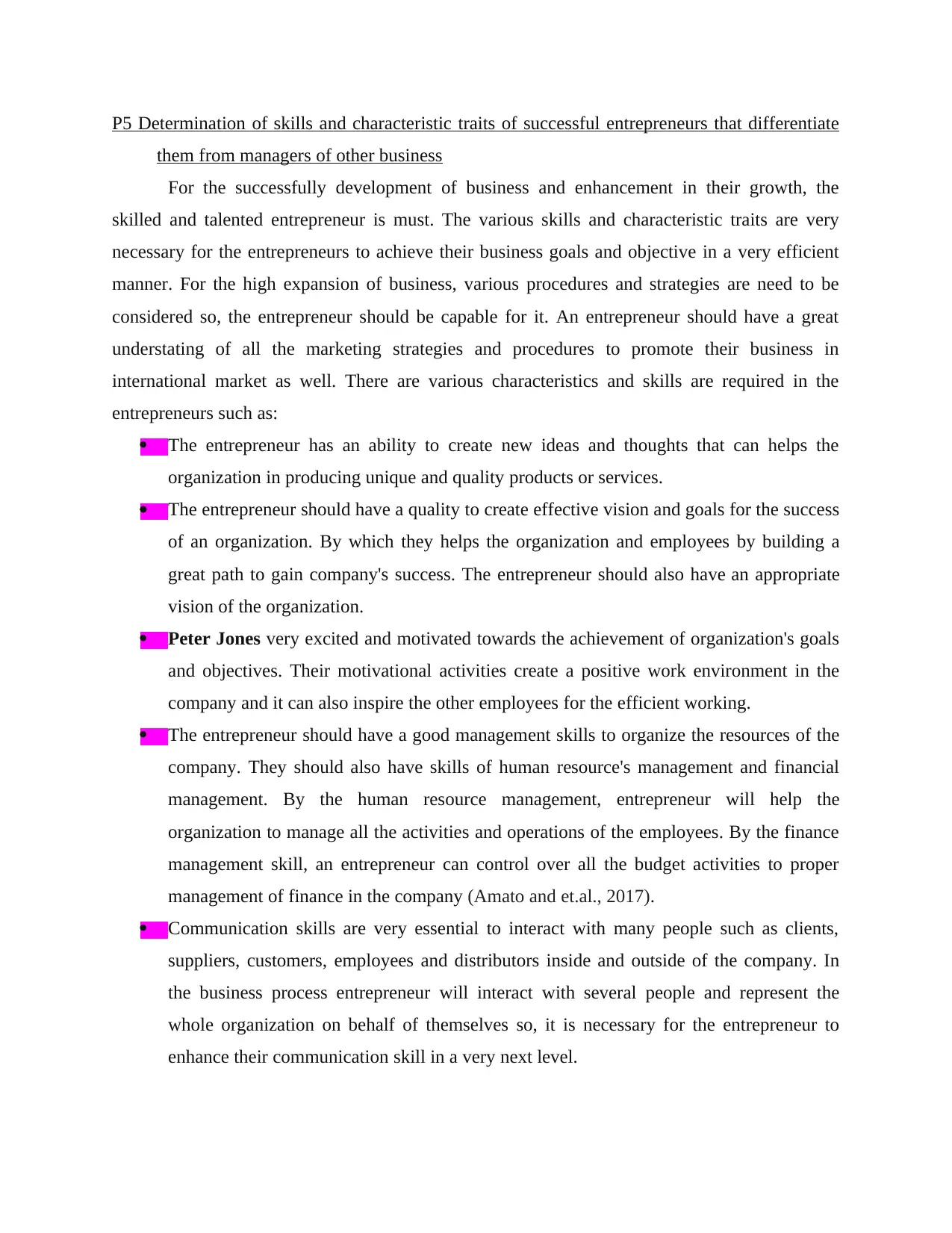
P5 Determination of skills and characteristic traits of successful entrepreneurs that differentiate
them from managers of other business
For the successfully development of business and enhancement in their growth, the
skilled and talented entrepreneur is must. The various skills and characteristic traits are very
necessary for the entrepreneurs to achieve their business goals and objective in a very efficient
manner. For the high expansion of business, various procedures and strategies are need to be
considered so, the entrepreneur should be capable for it. An entrepreneur should have a great
understating of all the marketing strategies and procedures to promote their business in
international market as well. There are various characteristics and skills are required in the
entrepreneurs such as:
The entrepreneur has an ability to create new ideas and thoughts that can helps the
organization in producing unique and quality products or services.
The entrepreneur should have a quality to create effective vision and goals for the success
of an organization. By which they helps the organization and employees by building a
great path to gain company's success. The entrepreneur should also have an appropriate
vision of the organization.
Peter Jones very excited and motivated towards the achievement of organization's goals
and objectives. Their motivational activities create a positive work environment in the
company and it can also inspire the other employees for the efficient working.
The entrepreneur should have a good management skills to organize the resources of the
company. They should also have skills of human resource's management and financial
management. By the human resource management, entrepreneur will help the
organization to manage all the activities and operations of the employees. By the finance
management skill, an entrepreneur can control over all the budget activities to proper
management of finance in the company (Amato and et.al., 2017).
Communication skills are very essential to interact with many people such as clients,
suppliers, customers, employees and distributors inside and outside of the company. In
the business process entrepreneur will interact with several people and represent the
whole organization on behalf of themselves so, it is necessary for the entrepreneur to
enhance their communication skill in a very next level.
them from managers of other business
For the successfully development of business and enhancement in their growth, the
skilled and talented entrepreneur is must. The various skills and characteristic traits are very
necessary for the entrepreneurs to achieve their business goals and objective in a very efficient
manner. For the high expansion of business, various procedures and strategies are need to be
considered so, the entrepreneur should be capable for it. An entrepreneur should have a great
understating of all the marketing strategies and procedures to promote their business in
international market as well. There are various characteristics and skills are required in the
entrepreneurs such as:
The entrepreneur has an ability to create new ideas and thoughts that can helps the
organization in producing unique and quality products or services.
The entrepreneur should have a quality to create effective vision and goals for the success
of an organization. By which they helps the organization and employees by building a
great path to gain company's success. The entrepreneur should also have an appropriate
vision of the organization.
Peter Jones very excited and motivated towards the achievement of organization's goals
and objectives. Their motivational activities create a positive work environment in the
company and it can also inspire the other employees for the efficient working.
The entrepreneur should have a good management skills to organize the resources of the
company. They should also have skills of human resource's management and financial
management. By the human resource management, entrepreneur will help the
organization to manage all the activities and operations of the employees. By the finance
management skill, an entrepreneur can control over all the budget activities to proper
management of finance in the company (Amato and et.al., 2017).
Communication skills are very essential to interact with many people such as clients,
suppliers, customers, employees and distributors inside and outside of the company. In
the business process entrepreneur will interact with several people and represent the
whole organization on behalf of themselves so, it is necessary for the entrepreneur to
enhance their communication skill in a very next level.
⊘ This is a preview!⊘
Do you want full access?
Subscribe today to unlock all pages.

Trusted by 1+ million students worldwide
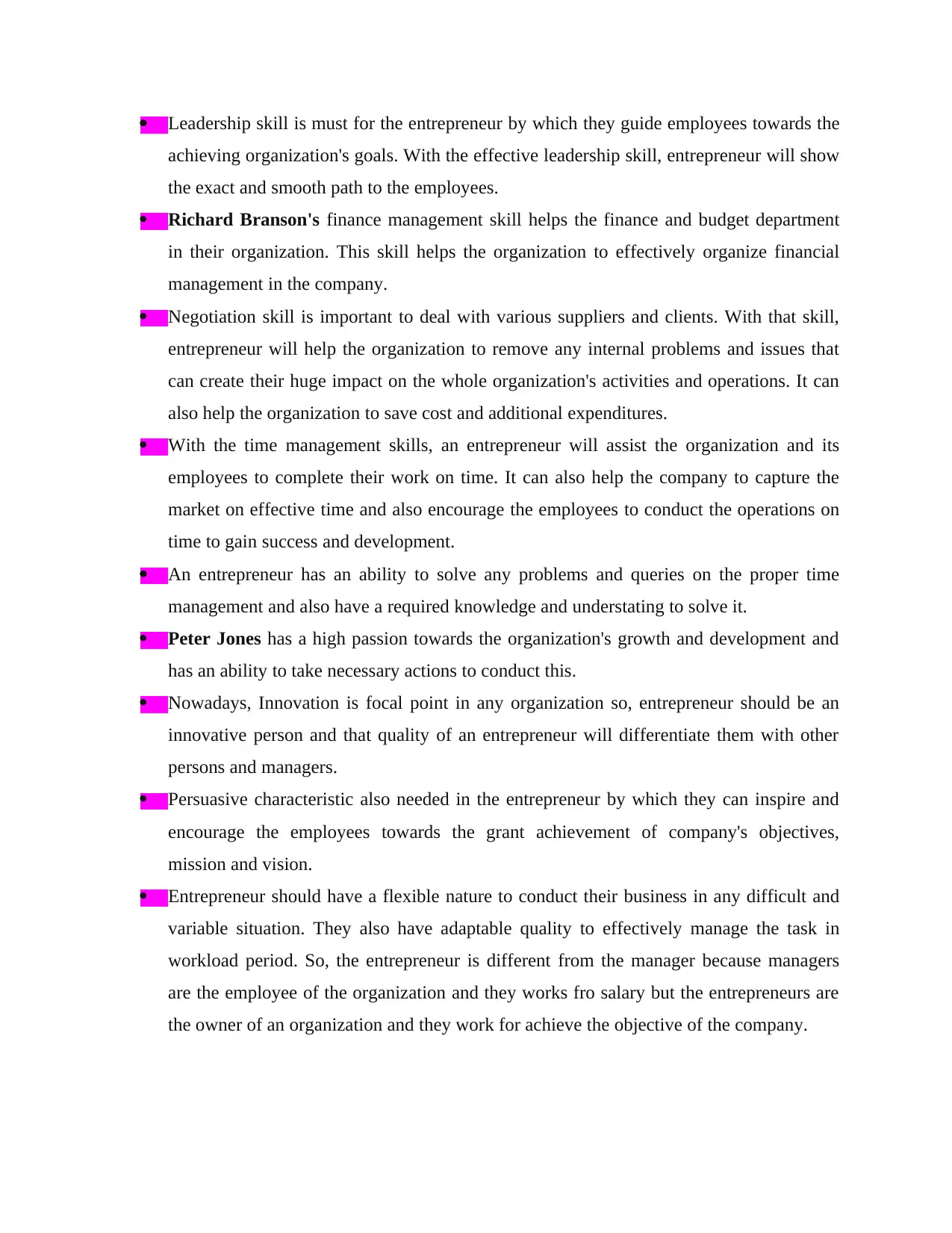
Leadership skill is must for the entrepreneur by which they guide employees towards the
achieving organization's goals. With the effective leadership skill, entrepreneur will show
the exact and smooth path to the employees.
Richard Branson's finance management skill helps the finance and budget department
in their organization. This skill helps the organization to effectively organize financial
management in the company.
Negotiation skill is important to deal with various suppliers and clients. With that skill,
entrepreneur will help the organization to remove any internal problems and issues that
can create their huge impact on the whole organization's activities and operations. It can
also help the organization to save cost and additional expenditures.
With the time management skills, an entrepreneur will assist the organization and its
employees to complete their work on time. It can also help the company to capture the
market on effective time and also encourage the employees to conduct the operations on
time to gain success and development.
An entrepreneur has an ability to solve any problems and queries on the proper time
management and also have a required knowledge and understating to solve it.
Peter Jones has a high passion towards the organization's growth and development and
has an ability to take necessary actions to conduct this.
Nowadays, Innovation is focal point in any organization so, entrepreneur should be an
innovative person and that quality of an entrepreneur will differentiate them with other
persons and managers.
Persuasive characteristic also needed in the entrepreneur by which they can inspire and
encourage the employees towards the grant achievement of company's objectives,
mission and vision.
Entrepreneur should have a flexible nature to conduct their business in any difficult and
variable situation. They also have adaptable quality to effectively manage the task in
workload period. So, the entrepreneur is different from the manager because managers
are the employee of the organization and they works fro salary but the entrepreneurs are
the owner of an organization and they work for achieve the objective of the company.
achieving organization's goals. With the effective leadership skill, entrepreneur will show
the exact and smooth path to the employees.
Richard Branson's finance management skill helps the finance and budget department
in their organization. This skill helps the organization to effectively organize financial
management in the company.
Negotiation skill is important to deal with various suppliers and clients. With that skill,
entrepreneur will help the organization to remove any internal problems and issues that
can create their huge impact on the whole organization's activities and operations. It can
also help the organization to save cost and additional expenditures.
With the time management skills, an entrepreneur will assist the organization and its
employees to complete their work on time. It can also help the company to capture the
market on effective time and also encourage the employees to conduct the operations on
time to gain success and development.
An entrepreneur has an ability to solve any problems and queries on the proper time
management and also have a required knowledge and understating to solve it.
Peter Jones has a high passion towards the organization's growth and development and
has an ability to take necessary actions to conduct this.
Nowadays, Innovation is focal point in any organization so, entrepreneur should be an
innovative person and that quality of an entrepreneur will differentiate them with other
persons and managers.
Persuasive characteristic also needed in the entrepreneur by which they can inspire and
encourage the employees towards the grant achievement of company's objectives,
mission and vision.
Entrepreneur should have a flexible nature to conduct their business in any difficult and
variable situation. They also have adaptable quality to effectively manage the task in
workload period. So, the entrepreneur is different from the manager because managers
are the employee of the organization and they works fro salary but the entrepreneurs are
the owner of an organization and they work for achieve the objective of the company.
Paraphrase This Document
Need a fresh take? Get an instant paraphrase of this document with our AI Paraphraser
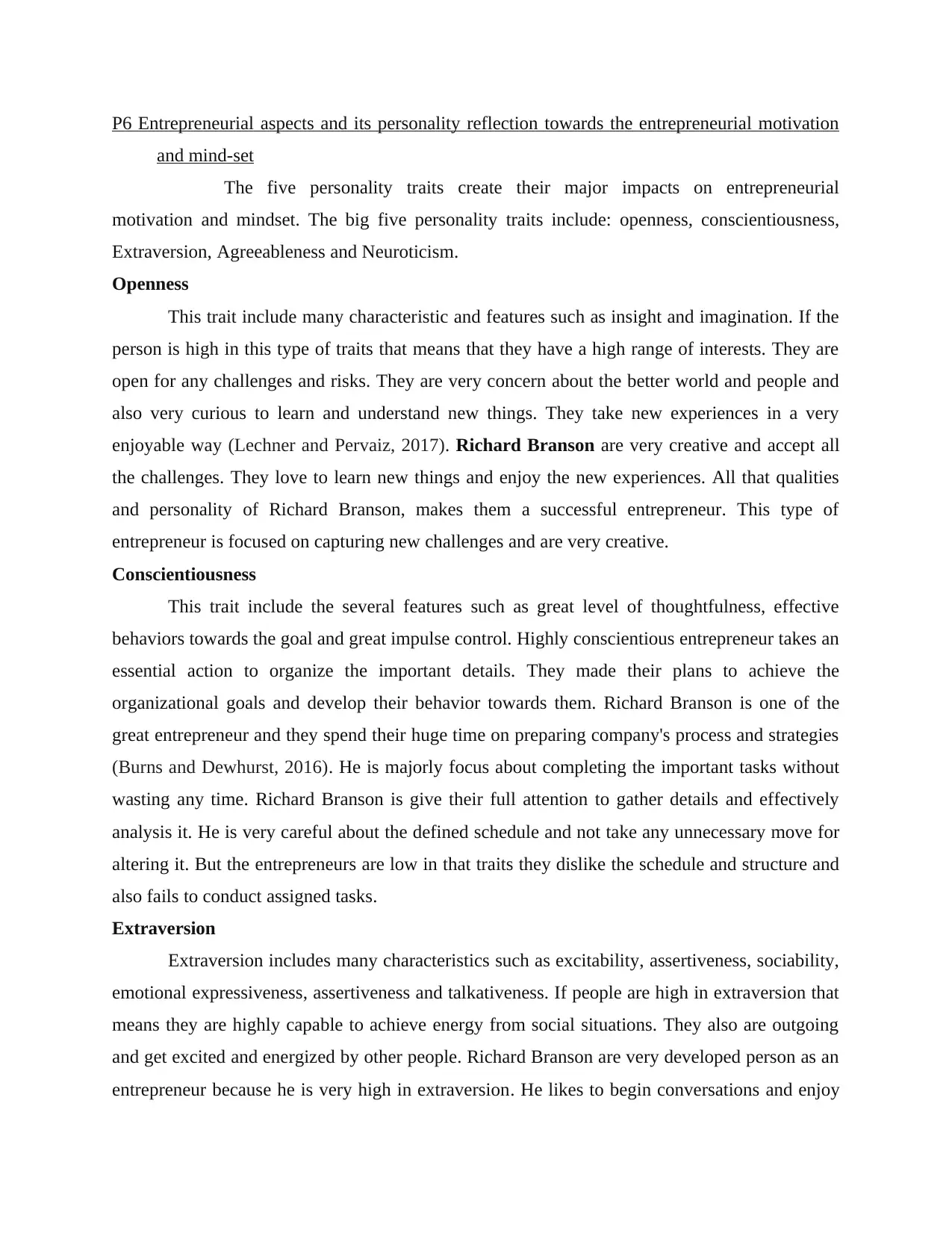
P6 Entrepreneurial aspects and its personality reflection towards the entrepreneurial motivation
and mind-set
The five personality traits create their major impacts on entrepreneurial
motivation and mindset. The big five personality traits include: openness, conscientiousness,
Extraversion, Agreeableness and Neuroticism.
Openness
This trait include many characteristic and features such as insight and imagination. If the
person is high in this type of traits that means that they have a high range of interests. They are
open for any challenges and risks. They are very concern about the better world and people and
also very curious to learn and understand new things. They take new experiences in a very
enjoyable way (Lechner and Pervaiz, 2017). Richard Branson are very creative and accept all
the challenges. They love to learn new things and enjoy the new experiences. All that qualities
and personality of Richard Branson, makes them a successful entrepreneur. This type of
entrepreneur is focused on capturing new challenges and are very creative.
Conscientiousness
This trait include the several features such as great level of thoughtfulness, effective
behaviors towards the goal and great impulse control. Highly conscientious entrepreneur takes an
essential action to organize the important details. They made their plans to achieve the
organizational goals and develop their behavior towards them. Richard Branson is one of the
great entrepreneur and they spend their huge time on preparing company's process and strategies
(Burns and Dewhurst, 2016). He is majorly focus about completing the important tasks without
wasting any time. Richard Branson is give their full attention to gather details and effectively
analysis it. He is very careful about the defined schedule and not take any unnecessary move for
altering it. But the entrepreneurs are low in that traits they dislike the schedule and structure and
also fails to conduct assigned tasks.
Extraversion
Extraversion includes many characteristics such as excitability, assertiveness, sociability,
emotional expressiveness, assertiveness and talkativeness. If people are high in extraversion that
means they are highly capable to achieve energy from social situations. They also are outgoing
and get excited and energized by other people. Richard Branson are very developed person as an
entrepreneur because he is very high in extraversion. He likes to begin conversations and enjoy
and mind-set
The five personality traits create their major impacts on entrepreneurial
motivation and mindset. The big five personality traits include: openness, conscientiousness,
Extraversion, Agreeableness and Neuroticism.
Openness
This trait include many characteristic and features such as insight and imagination. If the
person is high in this type of traits that means that they have a high range of interests. They are
open for any challenges and risks. They are very concern about the better world and people and
also very curious to learn and understand new things. They take new experiences in a very
enjoyable way (Lechner and Pervaiz, 2017). Richard Branson are very creative and accept all
the challenges. They love to learn new things and enjoy the new experiences. All that qualities
and personality of Richard Branson, makes them a successful entrepreneur. This type of
entrepreneur is focused on capturing new challenges and are very creative.
Conscientiousness
This trait include the several features such as great level of thoughtfulness, effective
behaviors towards the goal and great impulse control. Highly conscientious entrepreneur takes an
essential action to organize the important details. They made their plans to achieve the
organizational goals and develop their behavior towards them. Richard Branson is one of the
great entrepreneur and they spend their huge time on preparing company's process and strategies
(Burns and Dewhurst, 2016). He is majorly focus about completing the important tasks without
wasting any time. Richard Branson is give their full attention to gather details and effectively
analysis it. He is very careful about the defined schedule and not take any unnecessary move for
altering it. But the entrepreneurs are low in that traits they dislike the schedule and structure and
also fails to conduct assigned tasks.
Extraversion
Extraversion includes many characteristics such as excitability, assertiveness, sociability,
emotional expressiveness, assertiveness and talkativeness. If people are high in extraversion that
means they are highly capable to achieve energy from social situations. They also are outgoing
and get excited and energized by other people. Richard Branson are very developed person as an
entrepreneur because he is very high in extraversion. He likes to begin conversations and enjoy
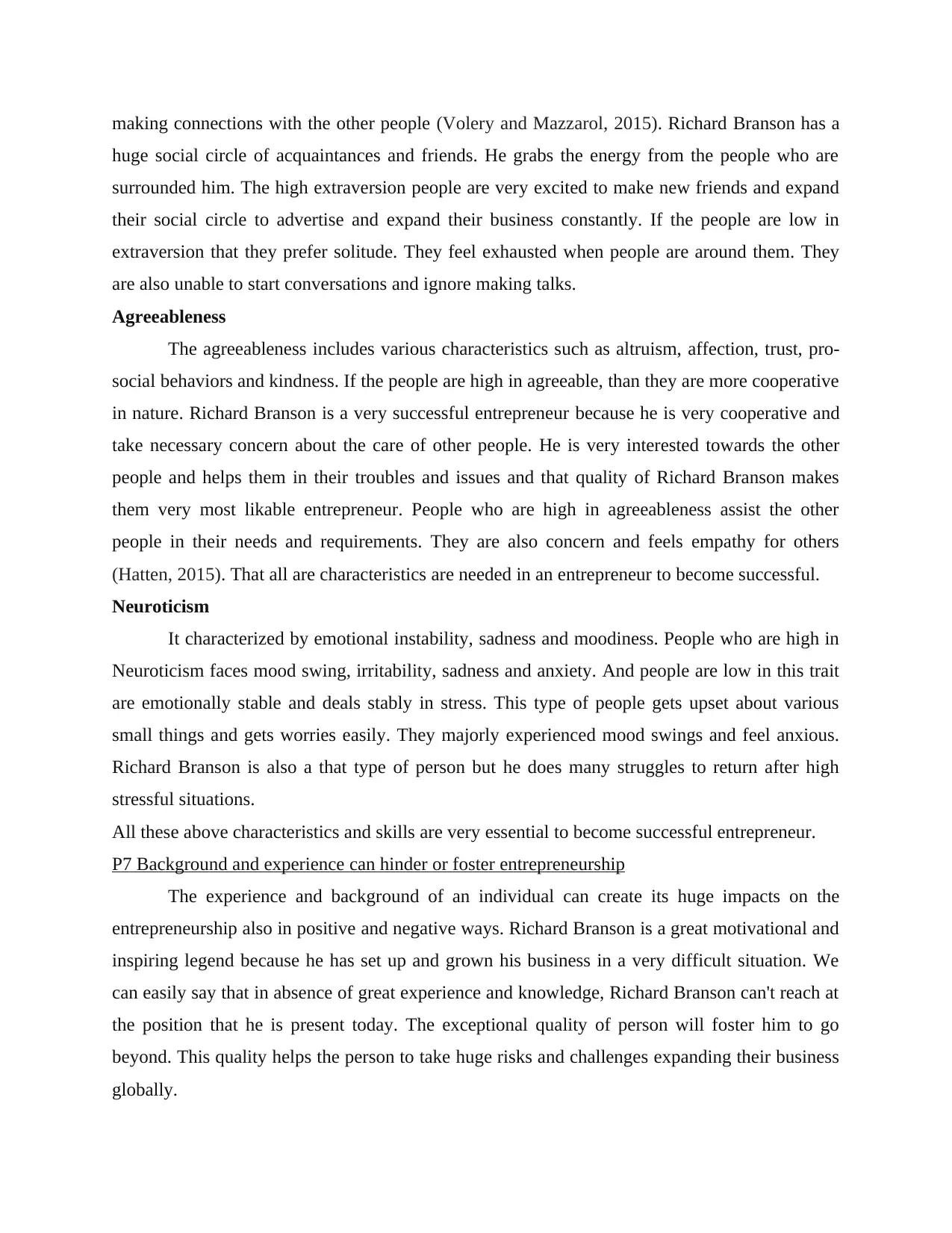
making connections with the other people (Volery and Mazzarol, 2015). Richard Branson has a
huge social circle of acquaintances and friends. He grabs the energy from the people who are
surrounded him. The high extraversion people are very excited to make new friends and expand
their social circle to advertise and expand their business constantly. If the people are low in
extraversion that they prefer solitude. They feel exhausted when people are around them. They
are also unable to start conversations and ignore making talks.
Agreeableness
The agreeableness includes various characteristics such as altruism, affection, trust, pro-
social behaviors and kindness. If the people are high in agreeable, than they are more cooperative
in nature. Richard Branson is a very successful entrepreneur because he is very cooperative and
take necessary concern about the care of other people. He is very interested towards the other
people and helps them in their troubles and issues and that quality of Richard Branson makes
them very most likable entrepreneur. People who are high in agreeableness assist the other
people in their needs and requirements. They are also concern and feels empathy for others
(Hatten, 2015). That all are characteristics are needed in an entrepreneur to become successful.
Neuroticism
It characterized by emotional instability, sadness and moodiness. People who are high in
Neuroticism faces mood swing, irritability, sadness and anxiety. And people are low in this trait
are emotionally stable and deals stably in stress. This type of people gets upset about various
small things and gets worries easily. They majorly experienced mood swings and feel anxious.
Richard Branson is also a that type of person but he does many struggles to return after high
stressful situations.
All these above characteristics and skills are very essential to become successful entrepreneur.
P7 Background and experience can hinder or foster entrepreneurship
The experience and background of an individual can create its huge impacts on the
entrepreneurship also in positive and negative ways. Richard Branson is a great motivational and
inspiring legend because he has set up and grown his business in a very difficult situation. We
can easily say that in absence of great experience and knowledge, Richard Branson can't reach at
the position that he is present today. The exceptional quality of person will foster him to go
beyond. This quality helps the person to take huge risks and challenges expanding their business
globally.
huge social circle of acquaintances and friends. He grabs the energy from the people who are
surrounded him. The high extraversion people are very excited to make new friends and expand
their social circle to advertise and expand their business constantly. If the people are low in
extraversion that they prefer solitude. They feel exhausted when people are around them. They
are also unable to start conversations and ignore making talks.
Agreeableness
The agreeableness includes various characteristics such as altruism, affection, trust, pro-
social behaviors and kindness. If the people are high in agreeable, than they are more cooperative
in nature. Richard Branson is a very successful entrepreneur because he is very cooperative and
take necessary concern about the care of other people. He is very interested towards the other
people and helps them in their troubles and issues and that quality of Richard Branson makes
them very most likable entrepreneur. People who are high in agreeableness assist the other
people in their needs and requirements. They are also concern and feels empathy for others
(Hatten, 2015). That all are characteristics are needed in an entrepreneur to become successful.
Neuroticism
It characterized by emotional instability, sadness and moodiness. People who are high in
Neuroticism faces mood swing, irritability, sadness and anxiety. And people are low in this trait
are emotionally stable and deals stably in stress. This type of people gets upset about various
small things and gets worries easily. They majorly experienced mood swings and feel anxious.
Richard Branson is also a that type of person but he does many struggles to return after high
stressful situations.
All these above characteristics and skills are very essential to become successful entrepreneur.
P7 Background and experience can hinder or foster entrepreneurship
The experience and background of an individual can create its huge impacts on the
entrepreneurship also in positive and negative ways. Richard Branson is a great motivational and
inspiring legend because he has set up and grown his business in a very difficult situation. We
can easily say that in absence of great experience and knowledge, Richard Branson can't reach at
the position that he is present today. The exceptional quality of person will foster him to go
beyond. This quality helps the person to take huge risks and challenges expanding their business
globally.
⊘ This is a preview!⊘
Do you want full access?
Subscribe today to unlock all pages.

Trusted by 1+ million students worldwide
1 out of 15
Related Documents
Your All-in-One AI-Powered Toolkit for Academic Success.
+13062052269
info@desklib.com
Available 24*7 on WhatsApp / Email
![[object Object]](/_next/static/media/star-bottom.7253800d.svg)
Unlock your academic potential
Copyright © 2020–2026 A2Z Services. All Rights Reserved. Developed and managed by ZUCOL.



